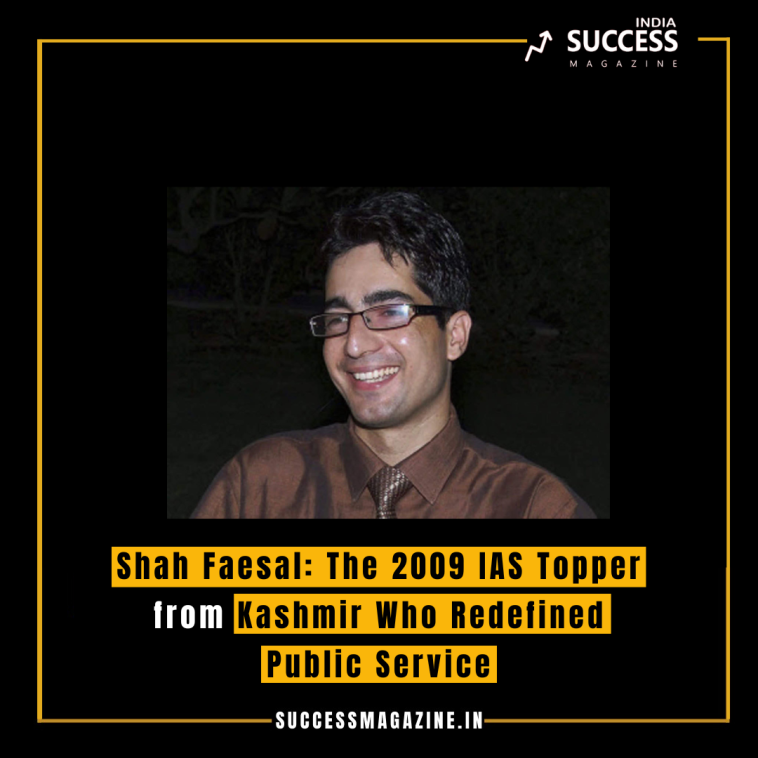Shah Faesal: The 2009 IAS Topper from Kashmir Who Redefined Public Service
Shah Faesal’s journey from the picturesque yet tumultuous region of Kashmir to the pinnacle of India’s civil service is a story of remarkable determination, resilience, and vision. In 2009, Faesal made headlines by securing the top rank in the Indian Administrative Service (IAS) examination, an achievement that not only marked a personal triumph but also resonated deeply with the aspirations of millions from his conflict-ridden homeland.
Born in the serene yet strife-ridden valley of Kashmir, Shah Faesal grew up amidst the challenges that characterize the region. His early life was shaped by the socio-political unrest that has long plagued Kashmir, yet he rose above these challenges with an unwavering resolve to achieve excellence. Faesal’s academic prowess became evident early on, as he consistently demonstrated a keen intellect and an insatiable curiosity for knowledge.
His success in the IAS examination was a testament to his hard work and dedication. The IAS examination is widely regarded as one of the most rigorous and challenging competitive exams in India, and topping it is no small feat. Faesal’s achievement was particularly significant given the backdrop of the ongoing conflict in Kashmir, which often places additional hurdles in the path of aspiring students.
Faesal’s success was not merely an individual achievement but also a beacon of hope for the youth of Kashmir. It showcased that despite the adversities, excellence and success are achievable with perseverance and dedication. His achievement resonated widely, symbolizing a potential shift in the narrative of Kashmir’s image, demonstrating that the region could also be a source of inspiration and positive change.
After topping the IAS exams, Shah Faesal’s career trajectory took him through various roles within the Indian Administrative Service. His initial postings were marked by a commitment to improving governance and public administration, and he became known for his innovative approach to problem-solving and his emphasis on effective, people-centric governance. Faesal’s work was characterized by a focus on transparency, efficiency, and accountability, reflecting his belief in the transformative power of public service.
In addition to his administrative roles, Faesal became an influential voice on several platforms, speaking out on issues related to governance, development, and the challenges faced by Kashmir. His public speeches and writings have often highlighted the need for reforms and the importance of addressing the unique socio-economic and political challenges faced by the region.
Despite his notable contributions, Faesal’s career was not without its challenges. His journey took a significant turn in 2019 when he resigned from the IAS, citing the need to work towards the resolution of Kashmir’s political issues from a different platform. Faesal’s decision to enter politics was seen by many as a continuation of his commitment to public service, albeit through a new avenue. He aimed to leverage his administrative experience to influence policy and contribute to meaningful change in his homeland.
Faesal’s story is a compelling narrative of personal achievement against the odds, and his impact extends beyond his IAS rank. His journey has inspired many young people, particularly from conflict zones, to pursue their dreams and work towards societal betterment. As he continues to navigate his role in politics and public service, Shah Faesal remains a symbol of hope and resilience, exemplifying the potential for individuals to effect significant change despite the most challenging circumstances.
In conclusion, Shah Faesal’s ascent to becoming the 2009 IAS topper from Kashmir represents more than just an individual accomplishment. It embodies a larger narrative of overcoming adversity, inspiring hope, and striving for meaningful change. His continued dedication to public service and his contributions to the discourse on governance and development underscore his commitment to making a positive impact on both his region and the broader society.


